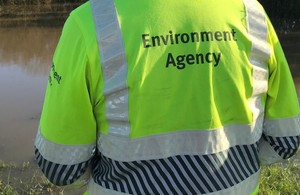Severn Trent Water prosecuted for Shropshire sewage pollution
Severn Trent Water Ltd has been fined £800,000 after allowing 3.8 million litres of raw sewage to enter a Shropshire stream from a local sewage treatment works.

The company pleaded guilty at Telford Magistrates’ Court to 3 charges:
-
causing sewage to discharge into the Row Brook from the Acton Burnell Treatment Works between November 2014 and May 2016
-
failing to provide a labelled sampling point
-
failing to operate and maintain a grass plot treatment facility
In the case brought by the Environment Agency, Severn Trent Water was yesterday fined £800,000 in total (£400,000 on the first and last charge and no separate penalty on the second).
They were ordered to pay costs of £70,420.28 and a victim surcharge of £120.The offences came to light on 10 May 2016 when a member of the public who was out walking dogs smelled a strong unpleasant odour and saw a ditch full of raw sewage at Acton Burnell.
As a result, an Environment Agency officer inspected the site and found the brook was polluted for 250 metres downstream of the works. This incident was caused by a fat blockage at the works inlet.
On returning 3 days later to check that the sewage had been cleared, the officer saw a discharge of raw sewage was happening again. A Severn Trent Water site operative told him that this was due to the expansion of a nearby school. He said the sewage works serving it was due to be upgraded. Sewage effluent normally discharges into storm tanks during very poor weather conditions, but in this case was found to have been incorrectly discharging via the works storm tanks during normal weather. This meant sewage was being discharged into the brook without being properly treated.
As a result of the pollution Severn Trent Water set up a system of pumping the storm tanks at the works to sludge holding tanks, which would then be emptied and taken off site by road tanker. This showed it was possible to run the site in accordance with their permit despite capacity issues.
A survey by the Environment Agency carried out the following day concluded that sewage in the brook had had a significant impact on macroinvertebrate ecology.
On inspecting the flow data to the works, the Environment Agency was able to show that discharges of raw sewage had been happening regularly for 17 months, calculating that during this period Severn Trent Water had illegally discharged over 3.8 million litres of raw sewage to the brook.
Speaking after the case, Environment Agency officer, Adam Shipp, said:
Severn Trent Water Limited had been aware of the capacity issues at the works since 2011 yet had taken inadequate steps to address them. When the incidents happened in May 2016 they were able to put in place simple measures that stopped raw sewage entering the brook. Putting the measures in place in 2011 would have protected the environment and kept them out of court.
He went on to say:
Water companies are aware that their activities have the potential for serious environmental impacts, and they know that we will take appropriate action when they cause pollution.
Notes to editors
Severn Trent Water was charged with:
-
Between 4 November 2014 and 13 May 2016 the Defendant, at the Acton Burnell Sewage Treatment Works (the Works) did cause a water discharge activity, namely a discharge of sewerage into Row Brook except under and to the extent authorised by an Environmental Permit, contrary to Regulation 38(1)(a) and Regulation 12(1)(b) of the Environmental Permitting (England & Wales) Regulations 2010.
-
Between 10 and 13 May 2016 the Defendant at the Works failed to provide and/or maintain at National Grid Reference SJ5299 0235 or some other point as agreed in writing with the Environment Agency a labelled sampling point so that a representative sample of the Discharge could be obtained, in breach of Condition 3 Schedule 2 of Environmental Permit S/02/55556/R contrary to Regulation 38(2) of the Environmental Permitting (England & Wales) Regulations 2010.
-
Between 10 and 13 May 2016 the Defendant at the Works failed to operate and maintain in accordance with good operational practice a grass plot treatment facility of not less than 1,099 square metres in breach of conditions 7 and 8 of Schedule 2 of Environmental Permit S/02/55556/R contrary to Regulation 38(2) of the Environmental Permitting (England & Wales) Regulations 2010.